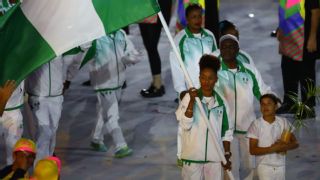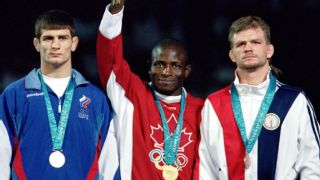|
Nigeria's Tokyo-bound athletes and administrators have been united in their support of the IOC's decision to postpone the 2020 Olympic Games, but concerns about the financial implications are occupying many of their minds. On Tuesday the International Olympic Committee, in conjunction with the Japanese government, announced that the Games would be shifted from late July this year to the northern summer of 2021, as a result of the global coronavirus pandemic. Habu Gumel, President of the Nigeria Olympic Committee sounded relieved at the news, telling ESPN: "The decision is in order and the NOC is in full support of it because it was done in order to protect the athletes, officials, and invited guests." Olympic gold medal winner Daniel Igali [for Canada, in 2000], president of the Nigeria Wrestling Federation, added: "I think it was the best decision in the circumstances." Table tennis star Funke Oshonaike, who qualified for a record eighth Games, was in equal agreement: "I just want everybody to be safe first and stay at home. After the virus, we can all go back to our normal life. Health is wealth." But aside from relief, there is also worry. Worry about the pandemic, of course, but largely about how the delay will affect finances across the board. Nigeria's Federal Government is the major source of funding for sports in the country, especially for the Olympic Games. Having to wait a nearly a full year is a long time to extend funding, and Oshonaike admits that it is a concern. She said: "Funding is a big thing and I hope Nigeria will provide this for me and the other athletes. The minister of sports is doing his best on that, so we remain hopeful."  But hope might not be enough. The country's biggest revenue source is oil, and prices have been tanking consistently with the outbreak of the virus. So much so that the government was compelled to reduce fuel prices. Those low oil prices will play all sorts of havoc with the country's budget. Igali appreciates the extent of the potential problem: "With oil prices at rock bottom, I am afraid whether Nigeria can adequately fund the Olympics when it comes around next year, except things improve drastically and soon." A constricted economy means the private sector, which has not been historically supportive of sports, will have even less motivation to do so, Igali believes, adding: "I am sure the excuse from this point on from the private sector would be that no one can support because they lost too much money to the pandemic. "The Federal Government will do its best as usual but I don't know." Some of the athletes already received training grants from the NOC in aid of their preparations. Gumel admits that there are complications but says everything will be clearer once the dust from COVID-19 settles.  The NOC boss explained: "True, some of these athletes received scholarships to assist with their training. These scholarships that we obtained was from the IOC and ANOCA which the athletes have already been enjoying. "But the current situation means that their training is not going the way it is supposed to, so we are waiting for the situation to improve. "Once that happens, I believe the athletes will go back and continue with their normal training and we will sort out the issue of funding at the administrative level." That is an optimistic take on what looks to be a bleak situation, but Oshonaike would rather kick that can down the road and focus on the immediate challenge. She said, pragmatically: "The young athletes should take this as a resting period. We can always do some fitness training for now. "Talking about adjustment, I guess I will have more time to train. Once the virus is gone, I can even go for more competitions to get myself back in shape. The only problem is that it will cost more and I hope Nigeria will support me and the other athletes on this. "Let us pray this virus is contained on time so we can go back to our normal lives. But it will cost us more." As for the sporting side of things, Oshinaike, Nigeria's assistant captain and Flag Bearer at the 2016 Games, urged competitors to focus on themselves and their own health. "Of course preparation will continue after coronavirus has died down. I don't even know what to think psychologically right now," she said, adding: "I'm not thinking so much about the Olympics right now. I'm actually thinking how all of us will survive this covid19." Igali agrees, but says the entire sporting fraternity will need to think differently to adapt the new set of circumstances. "Well, it's not something we have ever experienced before, so it's quite novel. I guess we would need to put our thinking hats on and be quite strategic about our plans going forward. "We were already at the peaking stage before the Olympic qualifiers due to take place in Morocco was called off. As you know, training without competing is like studying without sitting for exams. It's not fun at all." Read: Nigeria coach Mike Brown finds silver lining in delay Read: What's next for Tokyo? $5bn in losses and many moving parts Adapt they must, and Igali says he is already making plans to that effect: "For us at Nigeria wrestling, once the epidemic dies down, we will tailor our training to accommodate some local tournaments so they can be ready to complete the Olympic trials early next year. "Of course the likes of (Odunayo) Adekuoroye were very disappointed. But we impressed the need for safety in curtailing the epidemic. No mat wrestling till the epidemic subsides. "At the moment, we are looking to know the direction of the international federation so we can tailor our local programme to it." Disrupted training schedules, however, are probably the least of their worries, both at administrative and athlete level.
|
